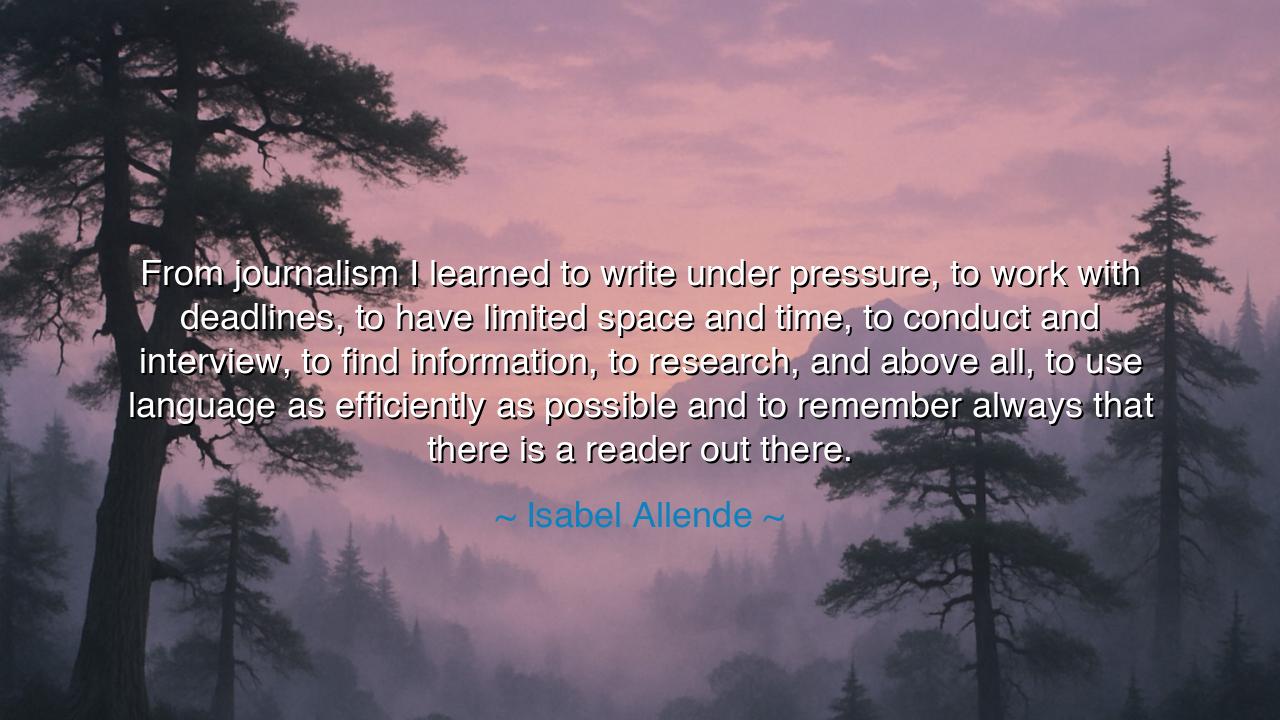
From journalism I learned to write under pressure, to work with
From journalism I learned to write under pressure, to work with deadlines, to have limited space and time, to conduct and interview, to find information, to research, and above all, to use language as efficiently as possible and to remember always that there is a reader out there.






Hear the voice of Isabel Allende, daughter of Chile and mistress of story, who declared: “From journalism I learned to write under pressure, to work with deadlines, to have limited space and time, to conduct an interview, to find information, to research, and above all, to use language as efficiently as possible and to remember always that there is a reader out there.” In these words we hear not only the training of a writer, but the forging of a discipline that transforms craft into art. For Allende speaks as one who passed through the fire of necessity and emerged with wisdom: that writing is not for the self alone, but a sacred act of service to another.
The meaning is layered. Journalism, with its harsh demands, teaches swiftness, precision, and economy of words. It imposes pressure, the urgency of truth that cannot be delayed. It compels respect for deadlines, for life itself does not wait. It confines one to narrow space and time, forcing the pen to cut away excess and leave only what is essential. In this furnace of restraint, the writer learns clarity, learns to strike with words like an arrow rather than a wandering breeze.
The origin of this wisdom is found in Allende’s own journey. Before she became known across the world for novels like The House of the Spirits, she worked as a journalist in Chile and later in exile. There she learned to chase facts, to question with courage, and to compress vast realities into short columns that ordinary people could grasp. This training gave her not only skill but discipline—the ability to labor faithfully, even when inspiration was absent, even when fear pressed close. Journalism taught her that writing is not only art, but work, and that work must serve the reader.
History too gives us echoes of this truth. Consider Ernest Hemingway, who began as a war correspondent before he became a novelist. From journalism he learned the power of brevity, the punch of a short sentence, the music of words stripped to their essence. Or think of George Orwell, who through the discipline of reportage sharpened the clarity that would later give us Animal Farm and 1984. In each case, it was the crucible of journalism that taught these writers to cut away waste and to serve the truth.
Yet there is more: Allende reminds us that above all else, there is a reader. Writing is not a soliloquy, not an echo chamber of one’s own voice, but a bridge from one soul to another. To forget the reader is to betray the purpose of language. For words are not mere ornaments; they are instruments meant to carry light, to feed hunger, to stir courage. The discipline of journalism engraves this truth upon the writer’s heart: that every sentence must serve, must reach, must honor the one who receives it.
The lesson for us is profound: whatever our craft, whether it is writing, speaking, teaching, or laboring with hands, we must remember the other—the one who depends on our work, who waits to be served by it. Pressure will come, deadlines will loom, space and time will be scarce. But it is in these constraints that skill is sharpened, and through them we learn to labor not for ourselves alone, but for the greater good.
Practical action flows from this teaching. Embrace discipline; do not wait for perfect conditions. Write, speak, and act with clarity, remembering always who will be touched by your work. Learn to value limits, for they are teachers of efficiency and creativity. Seek out truth with diligence, as a journalist seeks facts, and let your words honor both the reality you describe and the humanity of the one who reads.
Take this as a guiding flame: “There is a reader out there.” Do not forget them. In every craft, there is someone waiting to be nourished by your labor. Let your words, your works, your days be shaped with this remembrance. For in serving others faithfully, even under pressure and in little time, you too will leave behind not just ink on a page, but light in another’s life.






AAdministratorAdministrator
Welcome, honored guests. Please leave a comment, we will respond soon